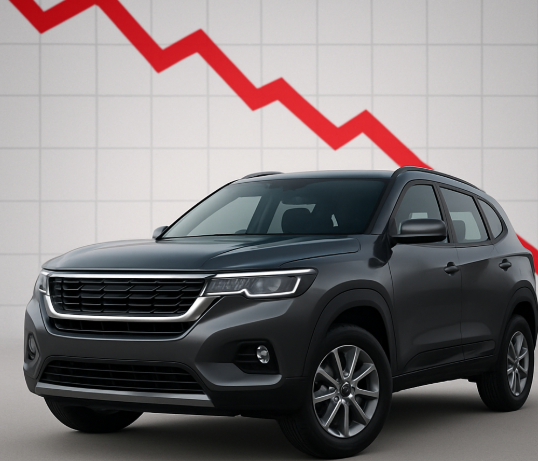
India’s auto sector is witnessing a concerning trend. While car sales were already slowing down, the sports utility vehicle (SUV) segment—considered the backbone of India’s automobile growth for the past decade—has now shown signs of weakening. For the first time since the pandemic, SUV sales in India have registered a significant drop, raising questions about changing consumer preferences and the health of the overall auto industry.
June 2025 Marks First Major Decline in SUV Sales
According to media reports, SUV sales in India fell by 2.1% year-on-year in June 2025. Approximately 17.75 lakh SUV units were sold during the month, which is lower than the sales figure from June last year. This is the first month-over-month decline in SUV sales in the last five years.
The fall is especially noteworthy considering that SUVs account for nearly 55% of all vehicle sales in India. In simple terms, more than half of the cars sold in the country are SUVs, ranging from micro and compact models to mid-size and full-size variants. These vehicles have been popular across various customer segments for their size, road presence, and features.
What Is Causing the Decline in SUV Sales?
Industry analysts and market experts have cited several reasons behind the drop in demand:
Economic Uncertainty and Job Losses: A major factor impacting sales is the slowdown in the IT sector, which has witnessed widespread layoffs in recent months. With job security shaken, many potential buyers are postponing or canceling big-ticket purchases like cars.
Rising Fuel Prices: The increase in petrol and diesel prices is making consumers think twice before investing in fuel-hungry vehicles like SUVs. This has particularly impacted sales in the mid and large SUV segments.
Global Instability: Ongoing geopolitical issues, including the Russia-Ukraine war and other international tensions, have disrupted the global supply chain for raw materials. This has led to increased production costs and, in turn, higher vehicle prices in the domestic market.
Shifting Consumer Sentiment: Some experts believe that Indian consumers are now showing reduced enthusiasm for purchasing new SUVs, possibly due to rising costs, preference for fuel efficiency, or anticipation of newer electric models. The previously strong upward trend in SUV purchases may be stabilizing.
SUV Sales Growth Has Slowed Dramatically
Despite strong growth in the past few years, the recent slowdown is visible in quarterly figures. During the April–June quarter of 2025, SUV sales increased by only 5.6%, a significant drop compared to the 11.3% growth recorded during the same period last year.
Looking at the broader trend:
In 2022, SUV sales grew by 42%
In 2023, the growth slowed to 36%
In 2024, growth fell further to 27%
In June 2025, sales actually declined by 2.1%
This suggests a clear deceleration in momentum. In fact, SUV sales in June stood at 1,71,341 units, which is a sharp drop from January 2025 when 2,11,946 units were sold. Within this, luxury SUV sales in June were recorded at 3,660 units.
Is the SUV Boom Over?
In 2015, SUVs represented only 14.3% of India’s passenger vehicle market. That figure has since surged to 55%, highlighting the segment’s explosive rise. Even during the pandemic year of 2020, when overall car sales dropped by 18%, SUV sales only fell by 7%, indicating the segment’s resilience.
However, with the current data, some industry observers believe that the SUV market in India may have reached a saturation point. Whether the segment will grow further or stabilize at current levels remains uncertain.
Automakers Remain Optimistic
Despite the recent setback, car manufacturers are not overly worried. Most are betting on the upcoming festive season, beginning around October and November, to revive sales. Leading companies like Maruti Suzuki and Mahindra & Mahindra are preparing to launch new models to attract buyers.
Maruti Suzuki, India’s largest carmaker, has announced that it will launch two new SUVs this year, including an electric SUV. According to the company, its SUV market share has risen from 12% in 2022 to 21% currently.
Mahindra & Mahindra is also optimistic, projecting a 15–20% increase in its SUV sales in the coming months. Several other manufacturers are preparing to launch both electric and conventional SUVs to reignite consumer interest.
Conclusion
The slowdown in SUV sales marks a significant shift in India’s automobile market, one that could have broader implications for the industry. While rising fuel costs, economic uncertainties, and global instability have contributed to the decline, the coming festive season could provide the necessary boost to reverse the trend. Automakers are continuing to innovate and diversify their offerings in the hope that consumer sentiment will rebound.




